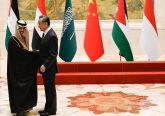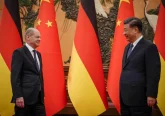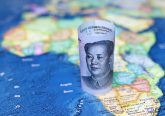 When westerners think about China, the concept that springs more and more to mind is modernity. This seems surprising when one looks at the statistics – after all, the developing middle class, an indicator of a more urban and modernizing society, is still a minority (perhaps 300 million of China’s 1.3 billion population), albeit a fast-growing one, and China remains a very poor country in terms of per capita GDP, as well as substantially rural. Yet in other areas, it’s clear that China is placing itself at the forefront of our understanding of what it means to be a modern state. One iconic area in this regard is space technology: the Chinese Shenzhou programme of space exploration seems particularly daring at a time when both American and European projects are falling victim to budget cuts in their increasingly hard-pressed homelands. Here China is boldly going where others can no longer afford to. Something else China can afford, when it chooses to, is to play a central part in the new world economic order. The sight of Europe asking for China to open its chequebook – and getting a dusty answer – was a highly instructive wake-up call about the new global realities.
When westerners think about China, the concept that springs more and more to mind is modernity. This seems surprising when one looks at the statistics – after all, the developing middle class, an indicator of a more urban and modernizing society, is still a minority (perhaps 300 million of China’s 1.3 billion population), albeit a fast-growing one, and China remains a very poor country in terms of per capita GDP, as well as substantially rural. Yet in other areas, it’s clear that China is placing itself at the forefront of our understanding of what it means to be a modern state. One iconic area in this regard is space technology: the Chinese Shenzhou programme of space exploration seems particularly daring at a time when both American and European projects are falling victim to budget cuts in their increasingly hard-pressed homelands. Here China is boldly going where others can no longer afford to. Something else China can afford, when it chooses to, is to play a central part in the new world economic order. The sight of Europe asking for China to open its chequebook – and getting a dusty answer – was a highly instructive wake-up call about the new global realities.
It would be a mistake, however, to think of China’s new prominence as a simple, linear story of expansion and self-assertion. In other areas, China still seems hesitant. On the Euro, it veers between strident statements that Europe needs to get its house in order, and hasty corrections arguing that it’s for the west to sort out its own problems. The elephant in the room is the US, still, of course, the world’s biggest economy and a cultural powerhouse. It may be in relative decline, but it looms large in every region of the world, including the Pacific. The Chinese see the Pacific as the site of a new regional hegemony: not territorial, but in terms of influence, both military and economic. Having the United States, with its powerful naval presence, in the Pacific, is a constant reminder that there is a check on their ambitions in the region and that not everyone in that region welcomes every aspect of China’s “peaceful rise.”
So what does this hesitant modernization mean? In two recent podcasts, I’ve had the opportunity for conversations with thinkers who have come to terms with some of the consequences of this shift in modernity. A couple of weeks ago, I chaired a talk and discussion with Wellcome Trust Fellow in the public understanding of science, Dr Kevin Fong, an advocate of space exploration, at Radio 3’s Free Thinking Festival in Gateshead. You can hear our discussion on the challenge from China, and whether Britain should develop its own space programme, here:
http://www.bbc.co.uk/programmes/b016vpy6 [as a Listen Again feature]
http://www.bbc.co.uk/podcasts/series/r3arts [as a podcast for download]
And a little earlier, I talked to Rob Gifford, China editor of The Economist in a podcast now on their website. The venerable magazine is launching a section dedicated just to China, an indicator of the country’s new prominence. Here we talk about two books that chart the country’s path to 21st century superpower status. First, Ezra Vogel’s magisterial biography Deng Xiaoping and the Transformation of Modern China, about the man who reinvented the country after the Cultural Revolution of the 1960s, and then Julia Lovell’s The Opium War, which charted the clash between Britain and China that first started the confrontation between west and east:
http://video.economist.com/index.jsp?fr_chl=42a1f6d8108abdb332b7fca160804772fc91a79c&rf=rss [search “Books of the Month China” and then Listen Again or download podcast]
Rana Mitter is Professor of the History and Politics of Modern China, Fellow, St Cross College. His publications include:
“Manchuria in Mind: press propaganda, and Northeast China in the age of empire, 1930-37,” in Mariko Asano Tamanoi, ed., Crossed Histories: New Approahes to Manchuria in the Age of Empire (Honolulu: University of Hawaii Press and the Association for Asian Studies, 2005), 25-52
(ed. with Sheila Jager), Ruptured Histories: War and Memory in Post-Cold War Asia . (Harvard University Press, 2007)
‘”Le devoir de la memoire: histoire, trauma et le massacre de Nankin”‘, Vingtieme Siecle, (2006)







No Comment